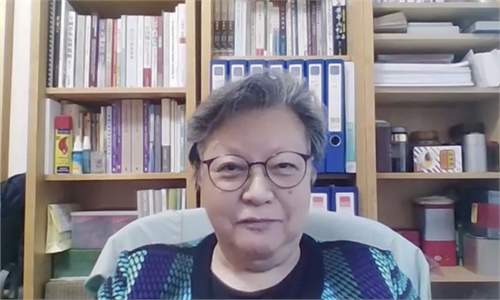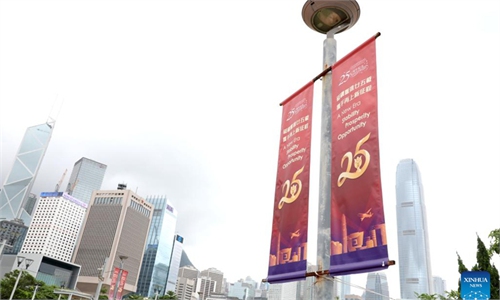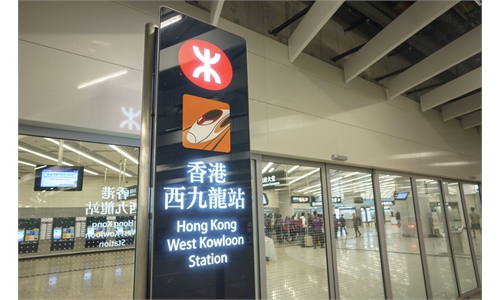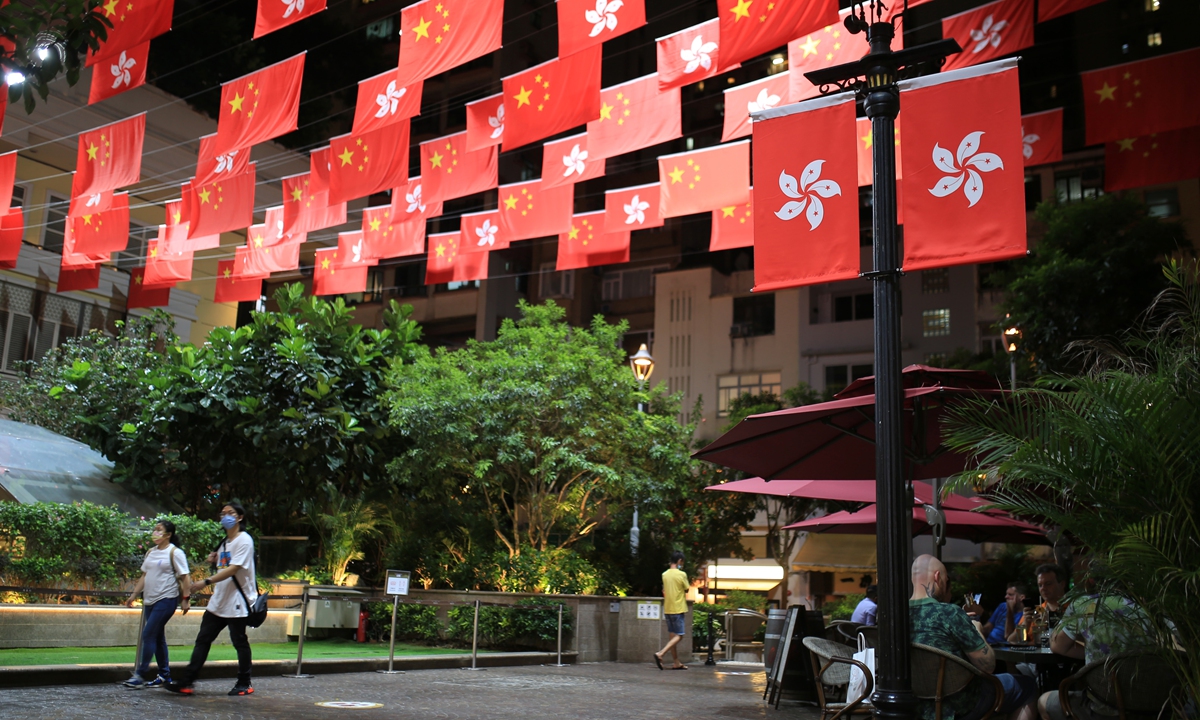
Hong Kong residents walk down streets under flying Chinese national flags and Hong Kong regional flags on June 28, 2022, as the city overflows with patriotic energy ahead of the 25th anniversary of its return to the motherland. Photo: Fan Lingzhi/Global Times
Looking south from the observation deck of the Hong Kong Palace Museum, a panoramic view of the Hong Kong Island complex opposite Victoria Harbor provides a perfect place for young people to film a vlog. Nearby, on a large green space, many Hong Kong residents were enjoying the sunshine. When the Global Times reporter shot a video of those scenes, a few birds' calls in the peaceful environment was particularly clear and pleasant, which touched the people's hearts.
This was a hard-fought scenario. In 2019, Global Times reporters witnessed the biggest crisis this city had faced since its return to the motherland in 1997. At the backdrop of the 25th anniversary of Hong Kong's return to the motherland, a Global Times reporter returned to the city that is now guarded by the national security law for Hong Kong and the electoral system reform. Comparing those heartbreaking pictures taken three years ago with the current scenarios, the strong contrast made people feel safe and secure now.
A photo of a foot bridge outside Victoria Park saved in the reporter's smart phone still looks depressing today. In the photo, people dressed in black blocked Causeway Road under the bridge. On June 16, 2019, the anti-government group Civil Human Rights Front instigated an illegal protest and they claimed that there were over 2 million people. Three years on, it didn't take reporter much time to find the bridge, because there was no need to squeeze through the crowd.
Standing on the bridge at the same angle for shooting the scene, clean streets and endless traffic were caught in the viewfinder. The reporter recorded narrations loudly in Putonghua, over and over again, but he wasn't worried about the hostility caused by the accent from the mainland. Such a sense of safety was beyond imagination three years ago.
Victoria Park under the bridge is the largest park on Hong Kong Island, with many leisure facilities for the public. But three years ago, this place was occupied by anti-China rioters for the starting point of the illegal protests or the place for illegal political gatherings, which seriously squeezed the public space for the Hong Kong residents.
When the Global Times reporter arrived at the park on Saturday, the park was setting up venues to celebrate the 25th anniversary of the city's return to the motherland. Inside the playground, young people played while some residents took photos in front of a large poster which read, "Blossom Around Town."
To mark the anniversary, the Leisure and Cultural Services Department (LCSD) organized the "Blossom Around Town" program to carry out beautification work at 51 prominent parks and locations in phases from June to October 2022, making the public feel the festive atmosphere of flowers
With the fresh air from the Victoria Park, the Global Times reporter walked eastward for less than 10 minutes, and the hustle and bustle of an international metropolis can be felt in Causeway Bay. Traffic lights made a rapid sound, pedestrians walked slowly and enjoyed a sunny weekend. "Let's go, consume together" was displaying on a huge screen at a shopping mall.
In order to stimulate consumption, the HKSAR government will distribute the second phase of HK$5,000 consumption vouchers in early August, with a one-month registration starting June 23, according to media reports.
This scene of prosperity was disrupted three years ago. On the night of August 31, 2019, a large number of rioters set fire on Causeway Bay and vandalized the area. The Global Times reporter took pictures in the same position, showing two different worlds, but the past scene broke people's hearts.
Some forces remain. At a crossroads, several men were distributing leaflets with anti-mainland and riot content. But compared to years ago, they had much weaker vigor and very few pedestrians took the leaflets. It turns out that these people are members of diehard anti-China group League of Social Democrats. After the Civil Human Rights Front dissolved last year, the League of Social Democrats appeared occasionally. The police arrived in minutes and observed the situation. Those people did not dare to look at the direction of the police car, hastily "closing the stalls."
After the national security law for Hong Kong and electoral system reform took effect, the political infiltration of anti-China and riot forces has been cleared, and a safe, orderly living space returned to Hong Kong.
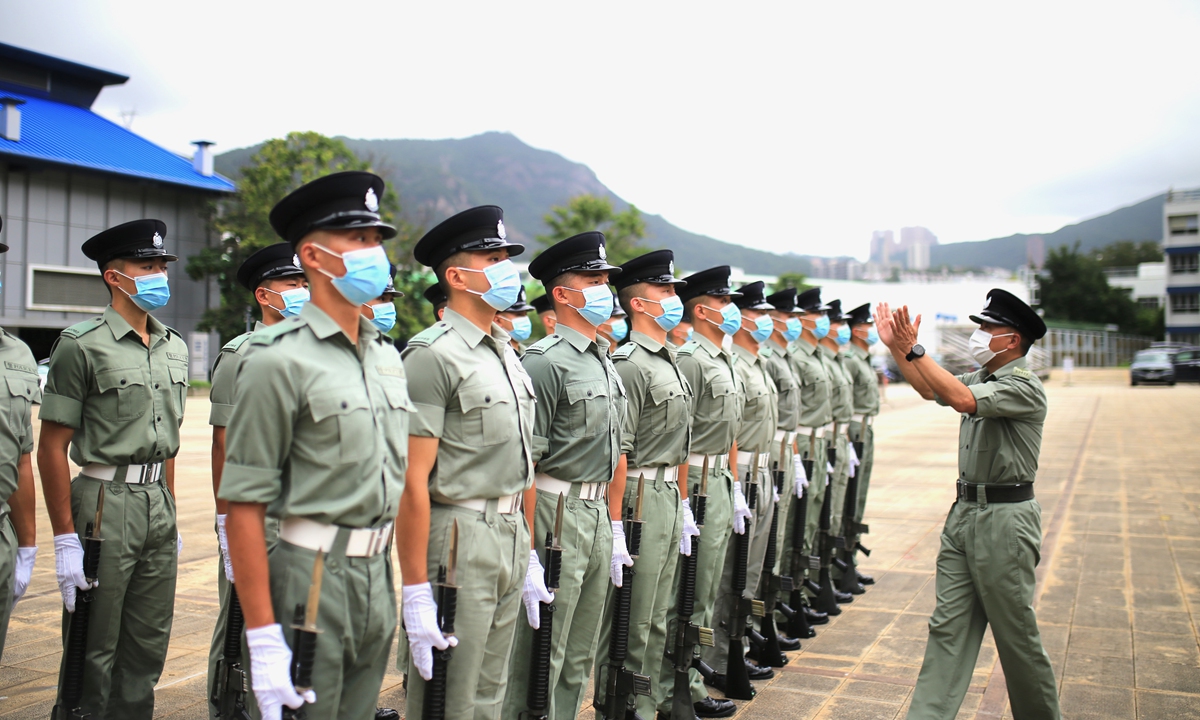
The Hong Kong Police Force. Photo: Fan Lingzhi/Global Times
'Sea of national flags'
Changes in the cultural field often reflect the shift in the social atmosphere, with the past antagonism between Hong Kong residents and those from the mainland, largely due to anti-mainland leaflets on the streets of Hong Kong and frightening political posters as well as shoddy publications. In the past years, those anti-mainland and riot forces deliberately created an environment for those from the mainland to receive the first signal when they arrived in Hong Kong: Here, we do not welcome you.
A large bookstore in Causeway Bay is a must-go for the Global Times reporter in Hong Kong, and in the past, the bookstore's "Chinese history" and "Hong Kong studies" sections were filled with books advocating anti-China and "Hong Kong independence" content with explosive titles, absurd content and vulgar taste. But when the reporter visited the bookstore a few days ago, these two sections still existed but those books have been replaced with books such as Modern Chinese History and Chinese American History, and the vision as well as style of the books were different from years ago.
Without hostile black and yellow anti-mainland and riot posters across the city, Hong Kong has restored its normal appearance. And the HKSAR government displayed "the sea of Chinese national flags" at the Lee Tung Street and Mody Road, attracting a large number of passersby to take pictures.
The education sector has been restored. On Monday morning, Fukien Secondary School Affiliated School held a flag-raising ceremony. The school's principal Eva Charisa Hsu delivered a speech to the students under the national flag about some general knowledge of the country. She also pushed forward national education in 2019, and told the Global Times that this work is being held every Monday and she would share with the teachers and students what she read from newspaper.
China's Hong Kong, Tracing the roots, Chinese culture, and China influencing the world … These are the topics of cultural and national content for textbooks edited by the school, which are also tailored to students of each grade.
John Lee Ka-chiu, the chief executive-elect of the HKSAR government, stressed recently that the national education system should be strengthened to enhance student's national awareness and identity.
The windows of the classrooms are covered with paintings made by students to celebrate the 25th anniversary of Hong Kong's return and a girl who took part in the curriculum activity asked the reporter, "Are you from the mainland? I want to go to Beijing!" When she was asked for the reason why she wanted to go there, the girl said, "Because my dad is from the mainland. And I heard that there's Tanghulu - a traditional Chinese snack of candied fruit in Beijing!"
Attaching importance to national education does not mean the rejection of Western culture. In the Fukien Secondary School Affiliated School, the posters and materials are published in both Chinese and English, and the Global Times learned that math and other subjects are taught in English, and to help students understand, they are also taught by both foreign and local teachers.
Though the epidemic made the exchange between the mainland and Hong Kong very difficult, exchange activities between the schools of two places have never been suspended. On Wednesday, Tsang Pik Shan (Sung Lan) Secondary School and Yantai Development Zone Experimental Middle School signed a deal online to become sister schools. Teachers and students communicated with each other online, giving fascinating performances.
Ho Pui Sing, the principal of the Hong Kong school, told the Global Times that years ago, a group of opposition voices toward national education dominated the local media. "At that time, I was a vice principal of another school and one day, some Japanese visited our school. One of them asked, "Why oppose national education?" Ho recalled, because that it's mandatory to carry out national education in Japan.
After the social turmoil, students and their parents have a deeper understanding about social stability, re-studying the concept of national security and holding a more active attitude to advance national education.
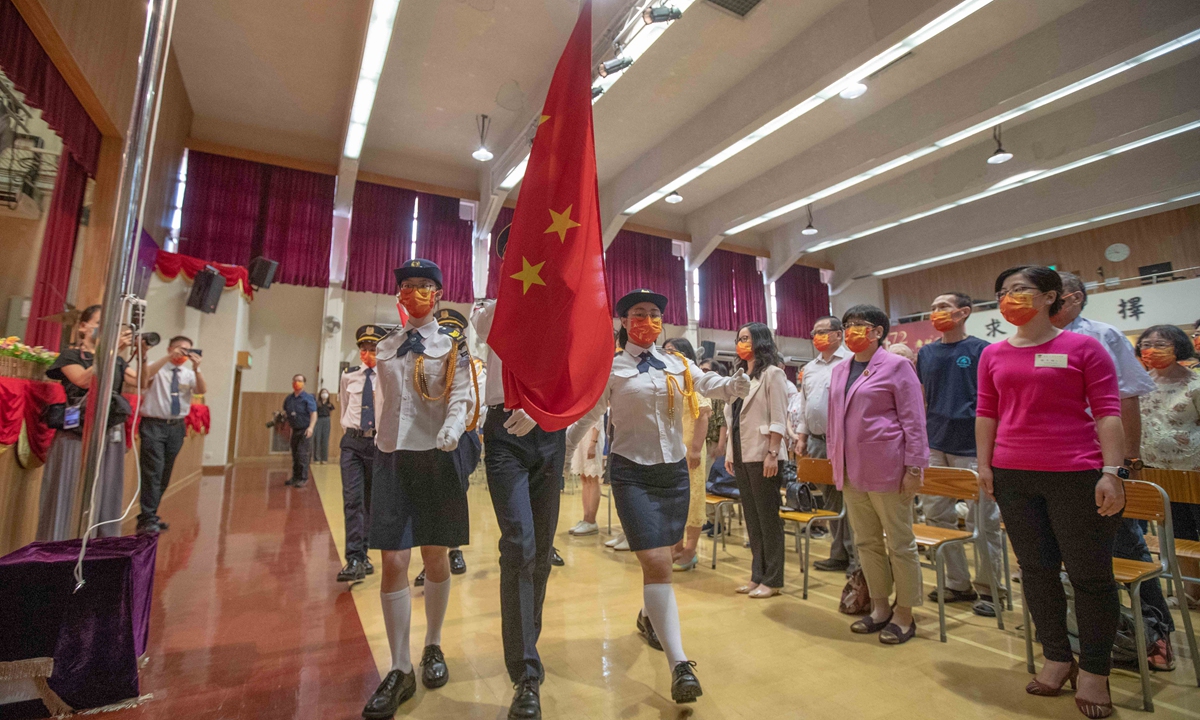
A flag-raising ceremony is held at Fukien Secondary School in Hong Kong Special Administrative Region on October 1, 2021. Photo: IC
A beautiful 'turnaround'
The dividends of stability are not only reflected in the easing of the social atmosphere but also the improvement in local government efficiency. On June 21, the Global Times reporter left behind his camera in a taxi and then reported it to the police in Mong Kok.
In 2019, police stations had to receive countless phone calls every day amid the social turmoil. Three years later, the Global Times reporter was not much hopeful finding the camera. But in the reporting room, there were only a few people. A police officer asked the reporter to wait after he noted the taxi invoice, and it was surprising that less than half an hour later, the police officer told him the camera was found.
During this period, the reporter noted that very few people came to report the case, which reminded him of the latest criminal case numbers laid out by Hong Kong security chief Chris Tang Ping-keung recently. In an exclusive interview with the Global Times, Tang said criminal cases constantly dropped in Hong Kong and in the first quarter, the number declined 6.2 percent year-on-year. Violent crimes fell 10 percent from a year earlier, while robbery cases fell 23.3 percent, and theft cases fell nearly 50 percent.
People can finally concentrate on doing the right thing, which is the profound change for the city. Many people in Hong Kong have re-established their own position in the process of the city's transition from chaos to being well governed. And they made a beautiful "turnaround."
In an office in Sheung Wan, Hung Kam-in, a former member of the Kwun Tong District Council and convener of a think tank in Hong Kong, was making tea when the Global Times reporter visited, preparing to start work. The tea was from Meitan district of Zunyi, Southwest China's Guizhou Province. After he noticed that there were still many farmers who grow tea living in poverty, Hung said he decided to take part in poverty alleviation.
Since then, he looked for companies and individuals in Hong Kong who want to buy tea, and ordered tea at cost price, which not only saves money, but also secures the income of the tea farmers, a win-win situation.
Hung is also an old friend of the Global Times reporter, and over three years, he gained some weight, and his hairstyle and brand new shirt showed his transformation.
In 2019, Hung sometimes looked exhausted, and he had to visit many places in a day as a district councilor, writing an article condemning the black-clad violence every week. He was even attacked by the violent rioters in his district, and his eyes were also hurt by a laser pointer. "In the most difficult time, I was thinking that the worst result would be fighting for my life!"
When he was asked about whether this transformation would mean "living in seclusion," Hung smiled. After the new electoral system took effect with the principle of only patriots governing Hong Kong, more people are coming out to serve the city and serve local residents, which means there will be healthier competition.
"It's a good choice that we can adjust our identity and position in a flexible way," he said, noting that he was hoping to provide public services in different areas.
Hung is responsible for training at the city's largest pro-establishment group Democratic Alliance for the Betterment and Progress of Hong Kong, and also in charge of charity work. "I have made more friends, and they are also willing to support my work, which can also be said to be another kind of pioneering," he said, noting that pioneering work also contributes to the city.
"To grow a tree, the best time would be ten years ago, and then, now," Hong Wen, a member of the Legislative Council and the senior research director of the HKSAR government's central policy group, said in her new book A path for bridging the gap between two Hong Kongs. Originally from Guizhou, she came to pursue a PhD in Hong Kong in 2001 and then worked in a local think tank, the central policy group, and a local real estate firm. Since the implementation of the national security law and the electoral system reform, she began engaging in politics and became a lawmaker.
When asked why she did not join the LegCo earlier, Hong said it was mission impossible to join the previous LegCo full of political battles. Many like us from the mainland did not know "how to fight others."
Before the electoral system reform, the LegCo became dysfunctional, and Global Times reporters witnessed how anti-mainland lawmakers who were engaged in riots used filibuster tactics, and some even instigated and supported the rioters to vandalize the LegCo building.
After the national security law for Hong Kong took effect and the electoral system reform was completed, issues from a political perspective have been solved, and the rest should be left to the professionals to fix, she said, noting that in the new environment, she could play out her advantages and to provide quality suggestions to the HKSAR government.

